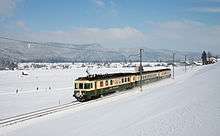Südostbahn

The Südostbahn (Swiss South Eastern Railway) – commonly abbreviated to SOB – is a railway company and 1,435 mm (4 ft 8 1⁄2 in) standard gauge network in Switzerland.
Structure
The Südostbahn is a small private railway, i.e. jointly owned by the cantonal and federal governments as an Aktiengesellschaft (AG). At the end of 2001, the previous SOB merged with the Bodensee–Toggenburg railway (BT) to form the Südostbahn (SOB).[1]
Network
The Schweizerische Südostbahn AG operates from Romanshorn on Lake Constance via St. Gallen, Herisau, Degersheim, Wattwil and Ebnat-Kappel to Nesslau-Neu Sankt Johann in northeast Switzerland, and from Rapperswil via Seedamm, Pfäffikon SZ and Biberbrugg to Arth-Goldau in Central Switzerland.
In all, the SOB network measures 128.9 kilometres (80.1 miles), and comprises the following lines:
- Romanshorn – St. Gallen St. Fiden (19.1 kilometres (11.9 miles))
- St. Gallen – Wattwil – Nesslau-Neu St. Johann (44.5 kilometres (27.7 miles))
- Rapperswil – Pfäffikon SZ (Seedamm) (4 kilometres (2.5 miles))
- Pfäffikon SZ – Arth-Goldau (34.6 kilometres (21.5 miles), including 6.1 kilometres (3.8 miles) common with Wädenswil–Einsiedeln)
- Wädenswil – Einsiedeln (16.7 kilometres (10.4 miles))
The Voralpen Express (VAE, Pre-Alpine Express), a named train, is jointly operated by the Südostbahn and the Swiss Federal Railways (SBB). It runs every hour as an InterRegio (IR) express train from Lucerne to St. Gallen via Arth-Goldau, Pfäffikon SZ, Rapperswil and Wattwil, continuing as a regional train to Romanshorn. SBB track is between Lucerne and Arth-Goldau, and between Rapperswil and Wattwil.
In addition, the SOB operates the S-Bahn Zürich services from Einsiedeln to Wädenswil (S13) and to Rapperswil (S40), and the S-Bahn St. Gallen services towards Rapperswil railway station.
Infrastructure
The direct connection from Bodensee via Zürichsee towards Vierwaldstättersee was achieved by numerous civil engineering structures, including the highest railway bridge in Switzerland, the 99 metres (325 ft) high and 365 metres (1,198 ft) long Sitter Viaduct near St. Gallen that was built between 1908 and 1910. Engineering structures account for an eighth of the total SOB rail network: 177 bridges spanning a total of 4.2 kilometres (2.6 miles), 19 tunnels through 8.5 kilometres (5.3 miles) of mountains, with a maximum slope of 50 per thousand (5 %) between Zürich, Biberbrugg and Arth-Goldau.[1]
Rolling stock

The Südostbahn (SOB) ordered four two-piece NPZ sets (RBDe 566 + ABt), which were delivered from the first production series in 1995 bearing numbers RBDe 566 400-403. The SOB opted not to convert any intermediate cars for use with these trainsets. Thus, the SOB DVT's differ from those of the SBB by the addition of a first class compartment. The locomotives, however, are identical to those of the SBB. The SOB has since converted several intermediate cars, however, and these trainsets are operated with them today. After the merger of the original SOB with the Bodensee-Toggenburg-Bahn to the new SOB, these four trainsets were repainted in the new livery of the SOB in 2003. They now operate throughout the SOB network as RBDe 566 077-080. Südostbahn had a fleet of ABt for their BDe 4/4 but they will soon be fully replaced by Stadler FLIRTs. NPZ ABt exist for the two types of RBDe 566 SOB ownes (566 071-076 ex BT and 566 077-080 ex SOB of the SBB-type). Nine BDt are used for the Voralpen Express with Re 456, Re 446 or SBB-CFF-FFS Re 420.
References
- 1 2 "Porträt: SOB Südostbahn" (in German). SOB. Retrieved 2015-03-19.
External links
| Wikimedia Commons has media related to Südostbahn. |
- Official website (in German)
- Voralpen Express website (in German)
